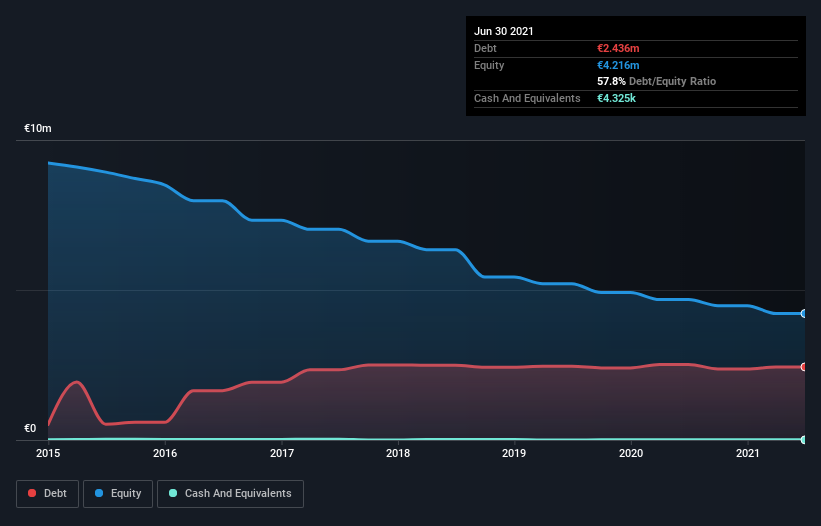- Greece
- /
- Metals and Mining
- /
- ATSE:LEBEK
N. Leventeris (ATH:LEBEK) Has Debt But No Earnings; Should You Worry?
Some say volatility, rather than debt, is the best way to think about risk as an investor, but Warren Buffett famously said that 'Volatility is far from synonymous with risk.' When we think about how risky a company is, we always like to look at its use of debt, since debt overload can lead to ruin. Importantly, N. Leventeris S.A. (ATH:LEBEK) does carry debt. But should shareholders be worried about its use of debt?
What Risk Does Debt Bring?
Generally speaking, debt only becomes a real problem when a company can't easily pay it off, either by raising capital or with its own cash flow. Ultimately, if the company can't fulfill its legal obligations to repay debt, shareholders could walk away with nothing. However, a more usual (but still expensive) situation is where a company must dilute shareholders at a cheap share price simply to get debt under control. By replacing dilution, though, debt can be an extremely good tool for businesses that need capital to invest in growth at high rates of return. When we examine debt levels, we first consider both cash and debt levels, together.
View our latest analysis for N. Leventeris
How Much Debt Does N. Leventeris Carry?
As you can see below, N. Leventeris had €2.44m of debt, at June 2021, which is about the same as the year before. You can click the chart for greater detail. Net debt is about the same, since the it doesn't have much cash.

How Healthy Is N. Leventeris' Balance Sheet?
The latest balance sheet data shows that N. Leventeris had liabilities of €1.98m due within a year, and liabilities of €1.85m falling due after that. Offsetting these obligations, it had cash of €4.3k as well as receivables valued at €315.9k due within 12 months. So its liabilities outweigh the sum of its cash and (near-term) receivables by €3.51m.
This is a mountain of leverage relative to its market capitalization of €3.53m. This suggests shareholders would be heavily diluted if the company needed to shore up its balance sheet in a hurry. The balance sheet is clearly the area to focus on when you are analysing debt. But you can't view debt in total isolation; since N. Leventeris will need earnings to service that debt. So when considering debt, it's definitely worth looking at the earnings trend. Click here for an interactive snapshot.
In the last year N. Leventeris's revenue was pretty flat, and it made a negative EBIT. While that's not too bad, we'd prefer see growth.
Caveat Emptor
Over the last twelve months N. Leventeris produced an earnings before interest and tax (EBIT) loss. Indeed, it lost a very considerable €379k at the EBIT level. When we look at that and recall the liabilities on its balance sheet, relative to cash, it seems unwise to us for the company to have any debt. Quite frankly we think the balance sheet is far from match-fit, although it could be improved with time. However, it doesn't help that it burned through €96k of cash over the last year. So to be blunt we think it is risky. When analysing debt levels, the balance sheet is the obvious place to start. But ultimately, every company can contain risks that exist outside of the balance sheet. For example, we've discovered 4 warning signs for N. Leventeris (2 make us uncomfortable!) that you should be aware of before investing here.
Of course, if you're the type of investor who prefers buying stocks without the burden of debt, then don't hesitate to discover our exclusive list of net cash growth stocks, today.
Valuation is complex, but we're here to simplify it.
Discover if N. Leventeris might be undervalued or overvalued with our detailed analysis, featuring fair value estimates, potential risks, dividends, insider trades, and its financial condition.
Access Free AnalysisThis article by Simply Wall St is general in nature. We provide commentary based on historical data and analyst forecasts only using an unbiased methodology and our articles are not intended to be financial advice. It does not constitute a recommendation to buy or sell any stock, and does not take account of your objectives, or your financial situation. We aim to bring you long-term focused analysis driven by fundamental data. Note that our analysis may not factor in the latest price-sensitive company announcements or qualitative material. Simply Wall St has no position in any stocks mentioned.
Have feedback on this article? Concerned about the content? Get in touch with us directly. Alternatively, email editorial-team (at) simplywallst.com.
About ATSE:LEBEK
N. Leventeris
Engages in production, marketing, and sale of wires and cables in Greece and internationally.
Slight risk with worrying balance sheet.
Market Insights
Community Narratives



